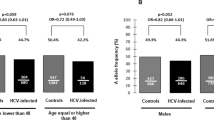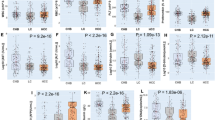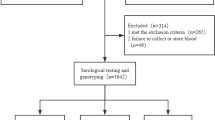Abstract
Glutathione S-transferase (GST) family is involved in a two-stage detoxification process of a wide range of environmental toxins, carcinogen and antiretroviral (ARV) therapy (ART) drugs. The aim of this study is to describe the impact of genetic polymorphisms of GSTM1, GSTT1 and GSTP1-313A/G in the risk of ARV-associated hepatotoxicity in HIV-infected individuals and its modulation in hepatotoxic patients. We enrolled a total of 34 patients with hepatotoxicity, 131 HIV-infected individuals without hepatotoxicity under non-nucleoside reverse transcriptase inhibitor containing ART and 153 unrelated healthy individuals. With a case–control design, polymorphisms of GSTM1, GSTT1 and GSTP1-313A/G gene were genotyped by PCR and restriction enzyme-length polymorphism. Genotypes of GSTT1 null were significantly higher in HIV-infected individuals as compared with healthy controls (P=0.01, odds ratio (OR)=1.54). HIV-infected individuals with GSTM1-null genotype showed higher risk (P=0.09, OR=1.37) for hepatotoxicity, but risk was not significant. On evaluating gene–gene interaction models, GSTM1 null and GSTT1 null showed significant association with the risk of hepatotoxicity in HIV-infected individuals (P=0.004, OR=2.67) owing to synergistic effect of these genes. Individuals with GSTT1-null and GSTM1-null genotypes showed higher risk of hepatotoxicity with advanced stage of (CD4<200) of HIV infection (P=0.18, OR=1.39; P=0.63, OR=1.13). In case-only analysis, GSTT1-null genotype among alcohol users showed elevated risk of hepatotoxicity in HIV-infected individuals (P=0.12, OR=1.36, 95% confidence interval (CI): 0.94–1.97) as compared with GSTT1 genotypes. The carriers GSTM1-null+GSTT1-null genotype among nevirapine user showed prominent risk of hepatotoxicity in HIV-infected individuals (P=0.12, OR=4.21, 95% CI: 0.60–29.54). Hence, we can conclude that GSTT1-null and GSTM1-null genotypes alone and in combination may predict the acquisition of hepatotoxicity.
This is a preview of subscription content, access via your institution
Access options
Subscribe to this journal
Receive 6 print issues and online access
$259.00 per year
only $43.17 per issue
Buy this article
- Purchase on Springer Link
- Instant access to full article PDF
Prices may be subject to local taxes which are calculated during checkout
Similar content being viewed by others
References
Carr A, Cooper DA . Adverse effects of antiretroviral therapy. Lancet 2001; 356: 1423–1430.
Van Dyke RB, Wang L, Williams PL . Toxicities associated with dual nucleoside reverse-transcriptase inhibitor regimens in HIV-infected children. J Infect Dis 2008; 198: 1599–1608.
Van leth F, Phanuphak P, Ruxrungtham K, Baraldi E, Miller S, Gazzard B . Comparison of first-line antiretroviral therapy with regimens including nevirapine, efavirenz, or both drugs, plus stavudine and lamivudine: a randomized open-label trial, the study. Lancet 2004; 363: 1253–1263.
Reisler R, Liou S, Servoss J, Robbins G, Theodore D, Murphy R et al Incidence of hepatotoxicity and mortality in 21 adult antiretroviral treatment trials. Program and abstracts of The 1st IAS Conference on HIV Pathogenesis and Treatment; Buenos Aires, Argentina. MEDLINE Abstracts 43. July 8–11, 2001.
Nagpal M, Tayal V, Kumar S, Gupta U . Adverse drug reactions to antiretroviral therapy in AIDS patients at a tertiary care hospital in India: a prospective observational study. Indian J Med Sci 2010; 64: 245–252.
Kreisberg R . Clinical problem-solving. We blew it. N Engl J Med 1995; 332: 945–949.
Bissell DM, Gores GJ, Laskin DL, Hoofnagle JH . Drug-induced liver injury: mechanisms and test systems. Hepatology 2001; 4: 1009–1013.
Leist M, Volbracht C, Fava E, Nicotera P . 1-Methyl-4-phenylpyridinium induces autocrine excitotoxicity, protease activation, and neuronal apoptosis. Mol Pharmacol 1998; 5: 789–801.
Relling MV, Dervieux T . Pharmacogenetics and cancer therapy. Nat Rev Cancer 2001; 1: 99–108.
Marsh S, McLeod HL . Cancer pharmacogenetics. Br J Cancer 2004; 90: 8–11.
Walgren JL, Kurtz DT, McMillan JM . Lack of direct mitogenic activity of dichloroacetate and trichloroacetate in cultured rat hepatocytes. Toxicology 2005; 3: 220–230.
Gil L, Martínez G, González I, Tarinas A, Alvarez A . Contribution to characterization of oxidative stress in HIV/AIDS patients. Pharmacol Res 2003; 47: 217–224.
Parsons M, Campa A, Lai S, Li Y, Martinez JD, Murillo J et al. Effect of GSTM1-polymorphism on disease progression and oxidative stress in HIV infection: modulation by HIV/HCV co-infection and alcohol consumption. J AIDS Clin Res 2014; 4: pii: 10002337.
Ketterer B . A bird's eye view of the glutathione transferase field. Chem Biol Interact 2001; 138: 27–42.
Duell EJ, Holly EA, Bracci PM, Liu M, Wiencke JK, Kelsey KT . A population based case control study of polymorphism in carcinogen metabolizing genes smoking and pancreatic adenocarcinoma risk. J Natl Cancer Inst 2002; 94: 297–306.
Zimniak P, Nanduri B, Pikula S, Bandorowicz-Pikula J, Singhal SK, Srivastava SK . Naturally occurring human glutathione S-transferase GSTP1-1 isoforms with isoleucine and valine in position 104 differ in enzymic properties. Eur J Biochem 1994; 224: 893–899.
Feng FM, Guo M, Chen Y, Li SM, Zhang P, Sun SF et al. Genetic polymorphisms in metabolic enzymes and susceptibility to anti-tuberculosis drug-induced hepatic injury. Genet Mol Res 2014; 13: 9463–9471.
Martínez C, García-Martín E, Ladero JM, Herráez O, Ortega L, Taxonera C et al. GSTT1 and GSTM1 null genotypes may facilitate hepatitis C virus infection becoming chronic. J Infect Dis 2007; 195: 1320–1323.
Roy B, Chowdhury A, Kundu S, Santra A, Dey B, Chakraborty M et al. Increased risk of antituberculosis drug-induced hepatotoxicity in individuals with glutathione S-transferase M1 'null' mutation. J Gastroenterol Hepatol 2001; 9: 1033–1037.
Leiro V, Fernández-Villar A, Valverde D, Constenla L, Vázquez R, Piñeiro L et al. Influence of glutathione S-transferase M1 and T1 homozygous null mutations on the risk of antituberculosis drug-induced hepatotoxicity in a Caucasian population. Liver Int 2008; 6: 835–839.
Ribrag V, Koscielny S, Casasnovas O, Cazeneuve C, Brice P, Morschhauser F et al. Pharmacogenetic study in Hodgkin lymphomas reveals the impact of UGT1A1 polymorphisms on patient prognosis. Blood 2009; 113: 3307–3313.
Pirmohamed M, Alfirevic A, Vilar J, Stalford A, Wilkins EG, Sim E et al. Association analysis of drug metabolizing enzyme gene polymorphisms in HIV-positive patients with co-trimoxazole hypersensitivity. Pharmacogenetics 2000; 8: 705–713.
Feldman DN, Feldman JG, Greenblatt R, Anastos K, Pearce L, Cohen M et al. CYP1A1 genotype modifies the impact of smoking on effectiveness of HAART among women. AIDS Educ Prev 2009; 21: 81–93.
Setiawan VW, Zhang ZF, Yu GP, Li YL, Lu ML, Tsai CJ et al. M1 null genotypes and risk of gastric cancer: a case control study in Chinese population. Cancer Epidemol Biomarkers Prev 2000; 9: 73–80.
Li D, Dandara C, Parker MI . Ther34i1lC/T polymorphism in the GSTP1 gene is associated with increased risk of oesophageal cancer. BMC Genet 2010; 11: 47.
Núñez M, Lana R, Mendoza JL, Martín-Carbonero L, Soriano V . Risk factors for severe hepatic injury after introduction of highly active antiretroviral therapy. J Acquir Immune Defic Syndr 2001; 27: 426–431.
Wit F, Weverling G, Weel J, Jurrians S, Lange J . Incidence and risk factors for severe hepatotoxicity associated with antiretroviral combination therapy. J Infect Dis 2002; 186: 23–31.
Servoss JC, Kitch DW, Andersen JW, Reisler RB, Chung RT, Robbins GK . Predictors of antiretroviral-related hepatotoxicity in the adult AIDS Clinical Trial Group (1989-1999). J Acquir Immune Defic Syndr 2006; 3: 320–323.
Fromenty B, Pessayre D . Impaired mitochondrial function in microvesicular steatosis. Effects of drugs, ethanol, hormones and cytokines. J Hepatol 1997; 26: 43–53.
Cotton SC, Sharp L, Little J, Brockton N . Glutathione S-transferase polymorphisms and colorectal cancer. Am J Epidemiol 2000; 151: 7–32.
Rebbeck TR . Molecular epidemiology of the human glutathione S-transferase genotypes GSTM1 and GSTT1 in cancer susceptibility. Cancer Epidemiol Biomarks Prev 1997; 6: 733–743.
Singh H, Sachan R, Devi S, Pandey SN, Mittal B . Association of GSTM1 GSTT1, and GSTM3 gene polymorphisms and susceptibility to cervical cancer in a North Indian population. Am J Obstet Gynecol 2008; 198: 303.
Parveen F, Faridi RM, Das V, Tripathi G, Agrawal S . Genetic association of phase I and phase II detoxification genes with recurrent miscarriages among North Indian women. Mol Hum Reprod 2010; 16: 207–214.
Kant Shukla R, Kant S, Mittal B, Bhattacharya S . Comparative study of GST polymorphism in relation to age in COPD and lung cancer. Tuberk Toraks 2013; 61: 275–282.
Palli D, Saieva C, Gemma S, Masala G, Gomez-Miguel MJ, Luzzi I . GSTT1 and GSTM1 gene polymorphisms and gastric cancer in a high risk Italian population. Int J Cancer 2005; 115: 284–289.
Hunter DJ, Hankinson SE, Hough H, Gertig DM, Garcia-Closas M, Spiegelman D . A prospective study of NAT2 acetylation genotype, cigarette smoking, and risk of breast cancer. Carcinogenesis 1997; 18: 2127–2132.
Chiu BC, Kolar C, Gapstur SM, Lawson T, Anderson JR, Weisenburger DD . Association of NAT and GST polymorphisms with non-Hodgkin’s lymphoma: a population-based case–control study. Br J Haematol 2004; 128: 610–615.
Deng Y, Newman B, Dunne MP, Silburn PA, Mellick GD . Case-only study of interactions between genetic polymorphisms of GSTM1, P1, T1 and Z1 and smoking in Parkinson’s disease. Neurosci Lett 2004; 366: 326–331.
Greenland S . The effect of misclassification in the presence of covariates. Am J Epidemiol 1980; 112: 564–569.
Feldman JG, Minkoff H, Schneider MF, Gange SJ, Cohen M, Watts DH et al. Association of cigarette smoking with HIV prognosis among women in the HAART era: a report from the women's interagency HIV study. Am J Public Health 2006; 96: 1060–1065.
Samet JH, Cheng DM, Libman H, Nunes DP, Alperen JK, Saitz R . Alcohol consumption and HIV disease progression. J Acquir Immune Defic Syndr 2007; 46: 194–199.
Feldman DN, Feldman JG, Greenblatt R, Anastos K, Pearce L . CYP1A1 genotype modifies the impact of smoking on effectiveness of HAART among women. AIDS Educ Prev 2009; 21: 81–93.
Acknowledgements
We thank all the clinic staff for sample collection. This study was supported by a research grant provided by ICMR, India.
Author information
Authors and Affiliations
Corresponding author
Ethics declarations
Competing interests
The authors declare no conflict of interest.
Rights and permissions
About this article
Cite this article
Singh, H., Lata, S., Angadi, M. et al. Impact of GSTM1, GSTT1 and GSTP1 gene polymorphism and risk of ARV-associated hepatotoxicity in HIV-infected individuals and its modulation. Pharmacogenomics J 17, 53–60 (2017). https://doi.org/10.1038/tpj.2015.88
Received:
Revised:
Accepted:
Published:
Issue Date:
DOI: https://doi.org/10.1038/tpj.2015.88
This article is cited by
-
Influence of deoxynivalenol and zearalenone on the immunohistochemical expression of oestrogen receptors and liver enzyme genes in vivo in prepubertal gilts
Archives of Toxicology (2023)
-
Genetic polymorphism of drug metabolism enzymes (GSTM1, GSTT1 and GSTP1) in the healthy Malian population
Molecular Biology Reports (2020)
-
Impact of glutathione transferases genes polymorphisms in nevirapine adverse reactions: a possible role for GSTM1 in SJS/TEN susceptibility
European Journal of Clinical Pharmacology (2017)



